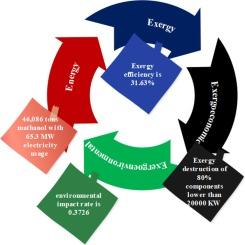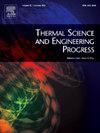通过联合循环发电和碳捕集一体化的 4E 分析,对低碳甲醇生产进行可行性评估
IF 5.1
3区 工程技术
Q2 ENERGY & FUELS
引用次数: 0
摘要
本研究采用综合 4E(能源、放能、经济和环境)方法评估了在无碳排放的情况下生产甲醇的可行性。我们的研究侧重于一个单一的甲醇生产系统,分析其效率、可持续性以及作为清洁燃料生产方法的潜力,从而重点关注从联合循环发电中捕获二氧化碳,并利用所产生的电力通过离子交换电解法生产氢气。我们使用 Aspen Plus 软件对系统进行了模拟,并考虑到了与现有发电厂能力相匹配的实际限制因素。分析表明,所研究的甲醇生产系统可生产 65.3 兆瓦的电力,其中 65.2 兆瓦的净生产电力可出售给国家电网。按 8,000 个运行小时计算,甲醇年产量为 46,086 吨。甲醇生产成本估计为每吨 556.69 美元,环境影响率为 0.3726 单位,放能效率为 31.63%。研究表明,利用联合循环中的碳捕集技术可以高效生产甲醇,显著减少二氧化碳排放。研究结果表明,虽然该系统涉及的设备成本较高,但它能有效平衡发电和甲醇生产,对环境的影响相对较小。未来的研究可侧重于先进的放能分析,以确定和减少放能破坏源,以及优化碳捕集配置和整合太阳能热能,以进一步提高系统的可持续性。本文章由计算机程序翻译,如有差异,请以英文原文为准。

Feasibility assessment of Low-Carbon methanol production through 4E analysis of combined cycle power generation and carbon capture Integration
This study evaluates the feasibility of producing methanol without carbon emissions Using a comprehensive 4E (energy, exergy, economic, and environmental) approach. Our study focuses on a single methanol production system, analyzing its efficiency, sustainability, and potential as a clean fuel production method so that focusing on capturing carbon dioxide from combined cycle power generation and using the generated power to produce hydrogen through ion exchange electrolysis. The systems were simulated using Aspen Plus software, considering practical constraints to align with the capacity of existing power plants. The analysis revealed that the studied methanol production systems can produce 65.3 MW of power, with a net production power of 65.2 MW available for sale to the national grid. The annual methanol production, based on 8,000 operational hours, is 46,086 tons. The cost of methanol production is estimated at $556.69 per ton, and the environmental impact rate was calculated at 0.3726 units, with an exergy efficiency of 31.63 %. The study demonstrates that methanol can be produced efficiently using carbon capture from combined cycles, significantly reducing carbon dioxide emissions. The results suggest that while the system involves high-cost equipment, it effectively balances power generation and methanol production with a relatively low environmental impact. Future research could focus on advanced exergy analysis to identify and mitigate sources of exergy destruction, as well as optimizing carbon capture configurations and integrating solar thermal energy to enhance system sustainability further.
求助全文
通过发布文献求助,成功后即可免费获取论文全文。
去求助
来源期刊

Thermal Science and Engineering Progress
Chemical Engineering-Fluid Flow and Transfer Processes
CiteScore
7.20
自引率
10.40%
发文量
327
审稿时长
41 days
期刊介绍:
Thermal Science and Engineering Progress (TSEP) publishes original, high-quality research articles that span activities ranging from fundamental scientific research and discussion of the more controversial thermodynamic theories, to developments in thermal engineering that are in many instances examples of the way scientists and engineers are addressing the challenges facing a growing population – smart cities and global warming – maximising thermodynamic efficiencies and minimising all heat losses. It is intended that these will be of current relevance and interest to industry, academia and other practitioners. It is evident that many specialised journals in thermal and, to some extent, in fluid disciplines tend to focus on topics that can be classified as fundamental in nature, or are ‘applied’ and near-market. Thermal Science and Engineering Progress will bridge the gap between these two areas, allowing authors to make an easy choice, should they or a journal editor feel that their papers are ‘out of scope’ when considering other journals. The range of topics covered by Thermal Science and Engineering Progress addresses the rapid rate of development being made in thermal transfer processes as they affect traditional fields, and important growth in the topical research areas of aerospace, thermal biological and medical systems, electronics and nano-technologies, renewable energy systems, food production (including agriculture), and the need to minimise man-made thermal impacts on climate change. Review articles on appropriate topics for TSEP are encouraged, although until TSEP is fully established, these will be limited in number. Before submitting such articles, please contact one of the Editors, or a member of the Editorial Advisory Board with an outline of your proposal and your expertise in the area of your review.
 求助内容:
求助内容: 应助结果提醒方式:
应助结果提醒方式:


